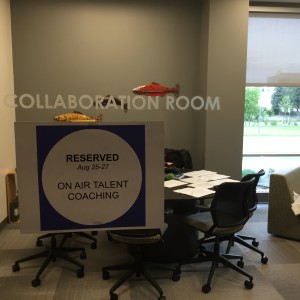How to Hire Great On-Camera Talent

One of my network clients was in the process of launching new programming.
“Can you give us some guidelines for selecting great hosts?”
That’s a brilliant question, and one that a talent coach doesn’t hear very often. The usual procedure is for on-camera talent to be hired based on a demo tape, an audition, interviews and references. And later, if it doesn’t work out exactly as expected, the talent coach might be called in to “fix” it. I take the position that everyone can be coached to a higher level of performance, but some challenging issues require more time and effort. Based on experience with hundreds of students and clients, here are some guidelines to improve your odds of hiring the next great on-camera talent.
1. Past experience in performing arts or sports. This is the number one predictor of who will be great at live TV or online video performance. Anyone trained in music, dance or theater knows what it’s like to master a score, choreography or a script and then perform it in front of an audience. Seasoned performers gain the confidence to improvise or “play jazz.” Successful athletes are able to take their skills and game plan from the practice field to the pressure of a game-changing moment. There is one exception to this rule: the person who skipped the school choir and the sports teams because they ONLY wanted to be on TV and have spent years focusing on that skill set.
2. Role in the Virtual Family. Someone with outstanding talent may not be the right fit for the role you need to fill. On a TV news program, viewers often relate to the presenters as family. The most senior anchor team may be mom and dad, while the morning or weekend teams might be more like the brothers or sisters you want to hang out with. Weather, traffic or sports presenters might be the wise friend or neighbor we turn to for advice in certain specialized areas. The virtual family is all-inclusive and should be able to relate to the diversity of your audience. You don’t want too many “moms” or “wise uncles” or “class clowns.” New hires should only get a short grace period as the up and coming “new kid on the block” before growing into a useful role in the virtual family.
3. Energy level. Technology filters out a certain amount of the energy and emotion in a performance, so an on-camera person needs a high energy level to consistently deliver a performance that breaks through to reach the audience. Talent coaching is much easier when you are working to focus natural energy, rather than trying to coax a person into a level of energy that does not feel natural to them. A person who uses natural gestures, open body language and an engaging smile in normal conversation is more likely to deliver all of those things in front of a camera. Someone who is not genuinely excited about your content will have a hard time engaging the audience.
4. Communication skills. Successful talent must communicate in a way that will be easily understood by your target audience. A person who writes and speaks clearly will do a much better job of delivering your content, whether they are writing it themselves, ad libbing or interpreting a script written by others. A slight accent usually isn’t a problem. Enunciation and articulation can be improved. Adding vocal variety in pace and pitch can help a person who may be talking too fast or slow. Poor grammar and rambling incoherent sentences are deal-breakers.
5. Driver or Passenger? Perhaps you’ve seen a guest on a talk show and thought, “Wow, that person would be a great host!” Well, just because you can ride on a bus and make interesting conversation with the other passengers, it doesn’t make you qualified to drive the bus. Even the person with great energy and strong communication skills as mentioned above may need talent coaching to learn how to “drive” the show, drive an interview or a story, or take turns “driving” with a partner.
6. Voice Quality. This is the number one issue in talent coaching. It can also be the most difficult to address. There are many factors that affect the sound of the human voice. Some are physical and some are behaviors that have been learned over a lifetime, such as breathing. Yes, it is possible to change the way you breathe and the way in which you use your voice. Changing your actual voice is much more complicated, requiring a serious commitment of time (sometimes years) and effort. Hiring someone and intending to “fix” their voice later is like moving into a house next door to the airport and complaining about the jet noise. It’s not likely to go away.
7. Appearance. Although many media managers put this first, it’s last on my list for a reason; it’s the easiest to fix. I use a simple set of guidelines to eliminate appearance distractions. The focus should be on the person, not their hair, clothing or makeup. Knockout looks are not required, and can even be a distraction. It’s much easier to give a poorly groomed performer a makeover than to alter the sound of a gorgeous presenter with an unpleasant delivery. Yes, it’s a visual medium, but looks are only part of the whole package required for a power performance.
Tweet





 Hi, I'm Terry Anzur. I've been a professional multimedia journalist for more than 30 years, anchoring and reporting everywhere from New York to Los Angeles to West Palm Beach. I've taught on-air skills to journalists of all levels, both through positions at the University of Southern California and Pepperdine University and through my own independent company.
Hi, I'm Terry Anzur. I've been a professional multimedia journalist for more than 30 years, anchoring and reporting everywhere from New York to Los Angeles to West Palm Beach. I've taught on-air skills to journalists of all levels, both through positions at the University of Southern California and Pepperdine University and through my own independent company.